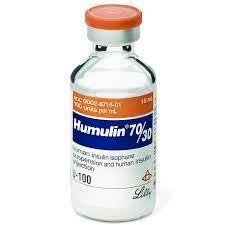Insulin isophane/insulin regular Interactions
There are 397 drugs known to interact with insulin isophane/insulin regular, along with 3 disease interactions, and 2 alcohol/food interactions. Of the total drug interactions, 16 are major, 360 are moderate, and 21 are minor.
- View all 397 medications that may interact with insulin isophane/insulin regular
- View insulin isophane/insulin regular alcohol/food interactions (2)
- View insulin isophane/insulin regular disease interactions (3)
Most frequently checked interactions
View interaction reports for insulin isophane / insulin regular and the medicines listed below.
- Acetylsalicylic Acid (aspirin)
- Acidophilus (lactobacillus acidophilus)
- Advair Diskus (fluticasone / salmeterol)
- Amaryl (glimepiride)
- Aspir 81 (aspirin)
- Aspirin Lite Coat (aspirin)
- Aspirin Low Strength (aspirin)
- Ativan (lorazepam)
- Augmentin (amoxicillin / clavulanate)
- Brilinta (ticagrelor)
- CoQ10 (ubiquinone)
- Crestor (rosuvastatin)
- Diovan (valsartan)
- Fish Oil (omega-3 polyunsaturated fatty acids)
- Flomax (tamsulosin)
- Glucophage (metformin)
- Lasix (furosemide)
- Metoprolol Succinate ER (metoprolol)
- Metoprolol Tartrate (metoprolol)
- Paracetamol (acetaminophen)
- Plavix (clopidogrel)
- Proscar (finasteride)
- Seroquel (quetiapine)
- Synthroid (levothyroxine)
- Tenormin (atenolol)
- Uloric (febuxostat)
- Vitamin B Complex 100 (multivitamin)
- Vitamin B12 (cyanocobalamin)
- Vitamin C (ascorbic acid)
- Zocor (simvastatin)
Insulin isophane/insulin regular alcohol/food interactions
There are 2 alcohol/food interactions with insulin isophane / insulin regular.
Insulin isophane/insulin regular disease interactions
There are 3 disease interactions with insulin isophane / insulin regular which include:
More about insulin isophane / insulin regular
- insulin isophane/insulin regular consumer information
- Compare alternatives
- Reviews (6)
- Side effects
- Dosage information
- During pregnancy
- Drug class: insulin
- En español
Related treatment guides
Drug Interaction Classification
| Highly clinically significant. Avoid combinations; the risk of the interaction outweighs the benefit. | |
| Moderately clinically significant. Usually avoid combinations; use it only under special circumstances. | |
| Minimally clinically significant. Minimize risk; assess risk and consider an alternative drug, take steps to circumvent the interaction risk and/or institute a monitoring plan. | |
| No interaction information available. |
See also:
Further information
Always consult your healthcare provider to ensure the information displayed on this page applies to your personal circumstances.


